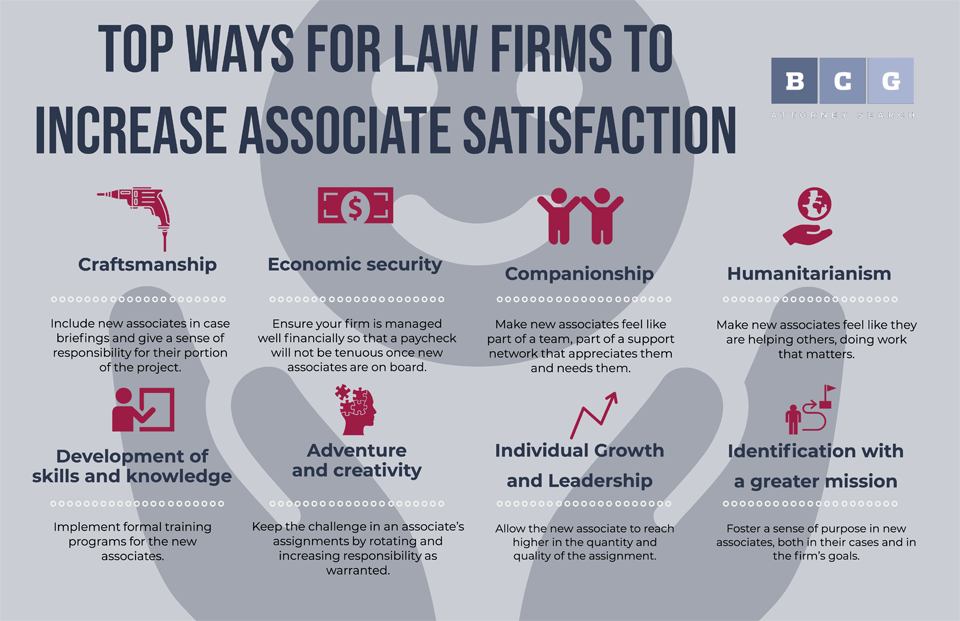Harrison Barnes' Legal Career Advice Podcast - Episode 75
- Staying relevant in today’s legal world can be a tall order.
- This is particularly true as the market becomes more complex and competitive.
- Look into this article to see how you can stay competitive.
Summary: The increasingly complex and competitive legal marketplace has forever altered the expectations of both law firms and associates. Here’s how to stay competitive.

In years past, law firms expected business growth as a matter of course. They hired the best associates and anticipated that everyone would become a partner. Associates expected the same. Career satisfaction and firm loyalty were presumed, with minimal attrition expected. But now the increasingly complex and competitive legal marketplace has forever altered the expectations of both law firms and associates. Those old expectations and presumptions are passing.
The hallowed traditions have been broken, often painfully. Firms previously allowed individuality and even an occasional "star turn" of certain associates or partners. Now many firms emphasize the firm culture and image over the individual's qualities. They often expect a team attitude, which places the firm's interests above that of each lawyer. Little allowance is given for individual lifestyle issues. The bottom line has acquired more importance, and consequently, emphasis is placed earlier on associate marketing, productivity, and rainmaking. Unfortunately, the definition of success and professionalism is often dictated solely by the bottom line. No longer is service to clients the only hallmark of a successful associate.

|
| Harrison Barnes |
Because of these major changes in the profession, efforts will have to be made to create long-term career satisfaction for current and future associates. Law firms, as well as associates, must be prepared to adopt new alternatives, replacing the outmoded relationships between associate and law firm. This section discusses both the issues that impede and the methods that enhance career satisfaction. It will also examine some of the newer alternatives and suggest means for implementation.

THE ASSOCIATE WISH LIST
With the current economic market, associates find there is increased intensity of competition with its concomitant pressure to excel and be productive. Yet at the same time, many desire to have a spouse, perhaps raise a family, and lead a semblance of a normal life, including pursuing some non-career related interests. A composite wish list for associates, based on my conversations with thousands of unhappy lawyers, includes the following:
- To be fully integrated into the law firm, treated with respect for past accomplishments, and given support and effective feedback for future efforts;
- To receive continuing education, both within and outside of the firm; interesting work, with increasing responsibility as ability warrants; humane and fair working arrangements; good pay; tolerable hours; and additional benefits and bonuses;
- To be treated as individuals, even allowed to market a specialized practice in a more entrepreneurial style;
- To identify with the compassionate values of the firm as demonstrated by pro bono commitments, training programs, employee diversity, reasonable billable hours, and part time and family leave policies.
Associates want a balance between professional and personal goals, between economic success and personal satisfaction. A consuming career is no longer enough.
WHY ASSOCIATES LEAVE A FIRM
The tradition of growing old with a law firm is being replaced by a new tradition of mobility. There are now numerous alternatives for lawyers with little stigma connected to job change. An associate who feels that either the firm is not fulfilling realistic expectations or the initial job selection was poor will have little reluctance to look elsewhere for work. If associates see their firm as less than fully committed to their partnership chances, they similarly feel less committed to the firm and more willing to make a lateral move.
Associate candidates who have been given incorrect information on firm policies on work flexibility, quality of work product, training programs, practice mix, levels of responsibility and how they increase, and assignment structure often will have unmet expectations that can lead to unhappiness. Thus it is imperative that those who qualify new candidates be as knowledgeable and forthright as possible about firm policies and procedures.
An associate often will change jobs when firm morale is low. Low morale can be caused by a general lack of regard for the needs or desires of employees, by the indiscreet termination of other associates, and especially by the exodus of partners from the firm (whether voluntarily or not). Some other reasons that cause an associate to leave a firm are a bad associate/partner match, an inadequate training program, poor assignments, an increased self-interest, or a faulty first job selection. Additionally, an associate may consider a move if the firm starts reducing the perceived humane elements of the working arrangement, such as sabbaticals or pro bono commitments, especially if these reductions are viewed as simply means to improve the bottom line.
COMPONENTS OF WORK SATISFACTION
Whatever the field of endeavor, satisfaction with one's work depends on a number of components. The greater the number of these components cultivated within the law firm, the more productive and desirable the work environment and in turn the greater the chances of attracting and retaining the best associates. The following components have been emphasized by firms. Others have been mostly ignored and need to be given greater attention.
- Craftsmanship
Most associates want to be involved in creating a final product and to see the fruits of their intelligence in a tangible way. They also want to have a sense of individual responsibility for the product. Rather than the fragmentation of assignments they often experience, they need to see the big picture and be included in its development and completion. Early on, new associates should be included in case briefings and given a sense of responsibility for their portion of the project.
- Economic Security
Traditionally, in exchange for their hard work, lawyers generated at least a living wage. However, in the last few years,the legal community has been shaken repeatedly with publicity about failed firms and tightened budgets. Economic security is now an issue for lawyers as the media reports instances of groups of associates and even partners terminated by their firms. Associates are looking for firms that are positioned competitively in the marketplace and managed well so that once they are on board, a paycheck will not be tenuous. Most associates also want to feel that they are receiving a fair income for their work.
- Companionship
Most workers have the desire to feel part of a team, part of a support network that appreciates them and needs them. The law firm that develops and fosters a cohesive and supportive team attitude will address this need for its associates. Including associates in case and firm decisions contributes to the development of a team attitude. The benefit to the firm is the loyalty of associates, currently in short supply in many firms.
- Humanitarianism
Most lawyers want to feel that they are helping others, doing work that matters. One of the most common complaints about the practice of law is that the work is not helping anyone or is meaningless. Although there will always be cases that appear removed from a humanitarian focus, the firm that assures its associates a good mix of cases will likely incorporate this value into at least some of the work. It is important to give associates early client contact so that they develop a relationship with the client. They may then come to see both the importance and the real-life impact of the work.
- Development of Skills and Knowledge
Associates want the opportunity to grow and develop greater proficiency and to take on more responsibility. When these needs are not met, an associate becomes stifled and bored. Those firms that have formal training programs are highly prized by job-seeking associates. Such programs are indicia of a commitment to an associate's professional progress. A formal mentoring program is an effective method for passing accrued knowledge. Mentoring additionally assists new associates in assimilating more comfortably into the firm and finding a niche.
- Adventure and Creativity
Most lawyers want to exercise their abilities to learn new things and solve problems. They abhor stagnation and repetitive, boring tasks. Thus it is important to keep the challenge in an associate's assignments by rotating and increasing responsibility as warranted. Although the needs of the firm must be met, it is also important to consider the growth and interests of each associate when assigning work.
- Individual Growth and Leadership
Most associates want the opportunity to show leadership and exercise judgment and power. In addition to including an associate in as much of a case as possible, the wise partner allows the associate to reach higher in quantity and quality of assignment. The progressive firm should institute this attitude as firm policy, encouraging supervising partners to share the juicier parts of a case with a desired associate.
- Identification with a Greater Mission
It is important to foster a sense of purpose in associates, both in their cases and in the firm's goals. Team spirit and the desire to do good work can give purpose to the cases. Including associates in case and firm decisions will foster team identification. But without stated goals, it is difficult for a firm to excite associates to work for the greater good of the firm. Therefore it is very important for a law firm to have a clear focus on its goals. These goals encompass, among other factors, market niche, style of practice, diversity of employees, size and growth of the firm, projected profitability, and lifestyle issues. A law firm that has established goals encourages associates to understand and identify positively with the mission of the firm.
HOW TO CREATE A DESIRABLE WORK ENVIRONMENT FOR ASSOCIATES
Law firms must now consciously supply many of the career satisfaction components that old, small, collegial law firms provided naturally. When all lawyers in the firm were friends, made consensus decisions, and worked directly and closely with each other and the clients, the problems that currently arise in growing firms did not exist. Now it is necessary to formalize practices to obtain and retain valued associates. The following suggestions are offered to firms to implement in their policy manuals and to associates to add to their list of interview questions about law firm practices.
- Establish a Niche for Each Associate. This can be done by personality. For example, if he likes problem solving, try estate planning or workouts; if she is extroverted or aggressive, trial work; if introverted, perhaps transactional work or research. Or institute a rotation program in the first year at the firm so that new associates can experience various areas of law. Try to accommodate the interests of new lawyers and assign them where they will be most useful and productive. Then, over the next few years, associates should be exposed to every major type of matter in their specialty.
- Assign a Mentor. Establish a formal mentoring system so that every associate has someone to turn to for advice, someone who is not the associate's direct supervisor. If such a program is not formalized, often the less gregarious or the "different" associates do not find a mentor.
- Acknowledge and Stress People Values. An atmosphere that is relaxed and friendly and that recognizes individuality and reflects continuing interest in the associate as an individual is important. An employer must balance the need for teamwork with the recognition of individuality. Lifestyle includes not just what is outside work hours but also the attitude within the firm. Long workdays do not necessarily constitute an undesirable style. But lack of feedback, a sinkorswim attitude, or repetitive, tedious tasks without a belief that more challenging work will be given do. Law firms that are concerned about their employees offer communication and stress management courses and firm meetings or retreats dealing with parts of employees' lives other than just the practice of law. A desirable employer exhibits sensitivity to staff and the concerns each brings to the workplace. It is important to try to balance lifestyle values with profitability, productivity, and marketing issues rather than make the last three the only goals.
- Acknowledge Values and the Importance of the Meaningfulness of Work. Values are the emotional salary of work for most attorneys and if they do not value their work, then no other incentive can possibly compensate them for their lost sense of being significant, important, part of something they value.Many lawyers complain that they do not feel that the work they do has any meaning and that they are merely churning paper and taking money from one pocket to put into another. Find a way to infuse a sense of excitement, meaning, and purpose into the work of the firm. Recognition, through bonuses or awards, of significant contributions to a case or to the firm generates enthusiasm. Allowing associates to cultivate client relationships can enhance a sense of meaning in a case. If a particular case is especially dull, increase associate interest through creative team management and new responsibilities. Assign routine duties to a paralegal when possible.
- Allow Associates to Participate in the Firm. To raise and keep morale high, give associates a voice in firm policy and management. Although a voice is not a vote, it is an acknowledgment of the importance of the issues concerning them. Set up an associates' advisory committee to air problems. Those who feel they are listened to feel more connected and appreciated, even if their advice is not followed.
- Provide for Training and Supervision with Thorough Evaluations on a Regular Basis. Even the brightest associates will feel overwhelmed if left on their own to learn all that a lawyer must know. A firm needs to sponsor its own formal training programs, send its associates to continuing education programs, team the associates with senior lawyers, or provide a mix of all three. It is especially important to assign and supervise work adequately and to have a regular and effective associate review system that gives meaningful feedback to improve each associate's performance. It may be necessary to train some partners in supervision and evaluation techniques in order to provide fair and constructive feedback.
- Allow for Growth, Then Reward Productivity and Contributions to the Firm. It is important to recognize that associates will progress at varied paces and to allow for individual growth and advancement. Include associates in client development and give them good client contact so that they can build a fruitful relationship with clients. Recognize that rainmaking is a skill to be learned and train associates to develop good marketing techniques. Realize that some people have the natural ability to attract clients or contacts and others have to learn. And when they do something right-making high billings, originating or retaining clients, or assisting with firm management or administration- reward their accomplishment, whether in the form of a bonus or other recognition.
- Create Programs and Address Issues That Indicate a Respect for the Individual.
- A reasonable billable-hour requirement is a necessity. No matter how much associates are paid, if there is not time to enjoy either the income or life outside the office, many associates will eventually leave. Departures due to excessive billing requirements are most common among associates who have been in practice for a few years, just as they are becoming more productive. This is a time when values change and lifestyle often becomes more important than income. If reducing billables by 100 or 200 hours a year preserves the estimated $100,000 investment in each of these lawyers, that is a financially sound decision in the long term.
- A firm should have detailed written policies covering part-time and flextime scheduling and parental concerns, such as parenting leave and routine and emergency daycare support, as well as the impact of the various choices on promotion and partnership. Even if they are not of immediate interest to an associate, such policies give an indication of the firm's values and provide associates with a level of comfort as to their future if they choose to request a variance in scheduling. Some firms have set up emergency or regular childcare centers. Parental leave should not only be established as a policy but be encouraged for both men and women. A firm that is unwilling to accommodate and support its caregivers stands to lose some of its brightest associates to more flexible firms.
- Encourage non-work interests in lawyers and allow flexible work schedules or leaves to accommodate those interests. Of course the business of a law firm is to practice law, but there are occasions when even the best associate wants to indulge for a time in another interest without being penalized. Part-time policies should accommodate an associate during this time the same as if she or he were spending time on other accepted endeavors, such as outside business interests, bar activities, or politics. Salary and benefits should be based on time spent on law matters. Those firms that have a policy allowing time off for non-work interests often find that their employees come back to the office refreshed, with renewed attention and fervor. And the recruiting points gained by this policy are immeasurable.
- Allow lawyers to make a humanitarian contribution. Liberal pro bono programs are often viewed by associates as an indicator of the firm's positive attitude toward the community and the individual, especially when some portion of the pro bono hours is included in the associate's billing requirement. The pro bono policy of a firm is a topic frequently inquired about by law school students.
- Adjustable compensation systems recognize that each person is different and each produces work at an individual pace. If a minimum billable requirement is set for a basic salary, with compensation increasing for specified increases in hours, each lawyer can choose how much to work. Paying bonuses for hours over a stated minimum is, to some associates, a highly motivating incentive, but the choice to bill more hours to receive the bonus or not to do so must truly be a choice, or the gradual increase in "minimum" billables will be greatly resented. Therefore, if the bonuses are represented as a lifestyle choice, they indeed must be.
- Benefits and perquisites can be used for associate rewards or as hiring inducements. The following perquisites should be considered: moving expenses, health/dental/disability/life insurance, loan on a home down payment, four weeks' vacation, percentage of fees generated by new business brought in by an associate, sabbatical leaves, professional and bar association dues, continuing education fees,parental leave, parking, retirement programs, health club membership, bonuses geared either to firm profits or to individual performance.
- Encourage and allow fun and humor-a "levity break"-in the practice of law. Lawyers are too often looked on as overly serious and humorless. Law need not be a mirthless discipline; fun and humor increase productivity, camaraderie, and enjoyment of work. Consider sponsoring a co-ed firm softball team or arranging a weekly 5:00 P.M. social hour at the firm.
A law firm that institutes all of the suggestions in this section will be deluged with resumes from potential associates, many unhappily ensconced at other, more restrictive firms. Each law firm must determine which practices are economically feasible and fit its distinctive goals. However, no firm can today remain competitive in associate hiring and avoid adopting at least some of these suggestions.
About Harrison Barnes
No legal recruiter in the United States has placed more attorneys at top law firms across every practice area than Harrison Barnes. His unmatched expertise, industry connections, and proven placement strategies have made him the most influential legal career advisor for attorneys seeking success in Big Law, elite boutiques, mid-sized firms, small firms, firms in the largest and smallest markets, and in over 350 separate practice areas.
A Reach Unlike Any Other Legal Recruiter
Most legal recruiters focus only on placing attorneys in large markets or specific practice areas, but Harrison places attorneys at all levels, in all practice areas, and in all locations-from the most prestigious firms in New York, Los Angeles, and Washington, D.C., to small and mid-sized firms in rural markets. Every week, he successfully places attorneys not only in high-demand practice areas like corporate and litigation but also in niche and less commonly recruited areas such as:
- Immigration Law
- Workers Compensation
- Insurance
- Family Law
- Trust and Estate
- Municipal law
- And many more...
This breadth of placements is unheard of in the legal recruiting industry and is a testament to his extraordinary ability to connect attorneys with the right firms, regardless of market size or practice area.
Proven Success at All Levels
With over 25 years of experience, Harrison has successfully placed attorneys at over 1,000 law firms, including:
- Top Am Law 100 firms such including Sullivan and Cromwell, and almost every AmLaw 100 and AmLaw 200 law firm.
- Elite boutique firms with specialized practices
- Mid-sized firms looking to expand their practice areas
- Growing firms in small and rural markets
He has also placed hundreds of law firm partners and has worked on firm and practice area mergers, helping law firms strategically grow their teams.
Unmatched Commitment to Attorney Success - The Story of BCG Attorney Search
Harrison Barnes is not just the most effective legal recruiter in the country, he is also the founder of BCG Attorney Search, a recruiting powerhouse that has helped thousands of attorneys transform their careers. His vision for BCG goes beyond just job placement; it is built on a mission to provide attorneys with opportunities they would never have access to otherwise. Unlike traditional recruiting firms, BCG Attorney Search operates as a career partner, not just a placement service. The firm's unparalleled resources, including a team of over 150 employees, enable it to offer customized job searches, direct outreach to firms, and market intelligence that no other legal recruiting service provides. Attorneys working with Harrison and BCG gain access to hidden opportunities, real-time insights on firm hiring trends, and guidance from a team that truly understands the legal market. You can read more about how BCG Attorney Search revolutionizes legal recruiting here: The Story of BCG Attorney Search and What We Do for You.
The Most Trusted Career Advisor for Attorneys
Harrison's legal career insights are the most widely followed in the profession.
- His articles on BCG Search alone are read by over 150,000 attorneys per month, making his guidance the most sought-after in the legal field. Read his latest insights here.
- He has conducted hundreds of hours of career development webinars, available here: Harrison Barnes Webinar Replays.
- His placement success is unmatched-see examples here: Harrison Barnes' Attorney Placements.
- He has created numerous comprehensive career development courses, including BigLaw Breakthrough, designed to help attorneys land positions at elite law firms.
Submit Your Resume to Work with Harrison Barnes
If you are serious about advancing your legal career and want access to the most sought-after law firm opportunities, Harrison Barnes is the most powerful recruiter to have on your side.
Submit your resume today to start working with him: Submit Resume Here
With an unmatched track record of success, a vast team of over 150 dedicated employees, and a reach into every market and practice area, Harrison Barnes is the recruiter who makes career transformations happen and has the talent and resources behind him to make this happen.
A Relentless Commitment to Attorney Success
Unlike most recruiters who work with only a narrow subset of attorneys, Harrison Barnes works with lawyers at all stages of their careers, from junior associates to senior partners, in every practice area imaginable. His placements are not limited to only those with "elite" credentials-he has helped thousands of attorneys, including those who thought it was impossible to move firms, find their next great opportunity.
Harrison's work is backed by a team of over 150 professionals who work around the clock to uncover hidden job opportunities at law firms across the country. His team:
- Finds and creates job openings that aren't publicly listed, giving attorneys access to exclusive opportunities.
- Works closely with candidates to ensure their resumes and applications stand out.
- Provides ongoing guidance and career coaching to help attorneys navigate interviews, negotiations, and transitions successfully.
This level of dedicated support is unmatched in the legal recruiting industry.
A Legal Recruiter Who Changes Lives
Harrison believes that every attorney-no matter their background, law school, or previous experience-has the potential to find success in the right law firm environment. Many attorneys come to him feeling stuck in their careers, underpaid, or unsure of their next steps. Through his unique ability to identify the right opportunities, he helps attorneys transform their careers in ways they never thought possible.
He has worked with:
- Attorneys making below-market salaries who went on to double or triple their earnings at new firms.
- Senior attorneys who believed they were "too experienced" to make a move and found better roles with firms eager for their expertise.
- Attorneys in small or remote markets who assumed they had no options-only to be placed at strong firms they never knew existed.
- Partners looking for a better platform or more autonomy who successfully transitioned to firms where they could grow their practice.
For attorneys who think their options are limited, Harrison Barnes has proven time and time again that opportunities exist-often in places they never expected.
Submit Your Resume Today - Start Your Career Transformation
If you want to explore new career opportunities, Harrison Barnes and BCG Attorney Search are your best resources. Whether you are looking for a BigLaw position, a boutique firm, or a move to a better work environment, Harrison's expertise will help you take control of your future.
Submit Your Resume Here to get started with Harrison Barnes today.
Harrison's reach, experience, and proven results make him the best legal recruiter in the industry. Don't settle for an average recruiter-work with the one who has changed the careers of thousands of attorneys and can do the same for you.
BCG Attorney Search matches attorneys and law firms with unparalleled expertise and drive, while achieving results. Known globally for its success in locating and placing attorneys in law firms of all sizes, BCG Attorney Search has placed thousands of attorneys in law firms in thousands of different law firms around the country. Unlike other legal placement firms, BCG Attorney Search brings massive resources of over 150 employees to its placement efforts locating positions and opportunities its competitors simply cannot. Every legal recruiter at BCG Attorney Search is a former successful attorney who attended a top law school, worked in top law firms and brought massive drive and commitment to their work. BCG Attorney Search legal recruiters take your legal career seriously and understand attorneys. For more information, please visit www.BCGSearch.com.
Harrison Barnes does a weekly free webinar with live Q&A for attorneys and law students each Wednesday at 10:00 am PST. You can attend anonymously and ask questions about your career, this article, or any other legal career-related topics. You can sign up for the weekly webinar here: Register on Zoom
Harrison also does a weekly free webinar with live Q&A for law firms, companies, and others who hire attorneys each Wednesday at 10:00 am PST. You can sign up for the weekly webinar here: Register on Zoom
You can browse a list of past webinars here: Webinar Replays
You can also listen to Harrison Barnes Podcasts here: Attorney Career Advice Podcasts
You can also read Harrison Barnes' articles and books here: Harrison's Perspectives
Harrison Barnes is the legal profession's mentor and may be the only person in your legal career who will tell you why you are not reaching your full potential and what you really need to do to grow as an attorney--regardless of how much it hurts. If you prefer truth to stagnation, growth to comfort, and actionable ideas instead of fluffy concepts, you and Harrison will get along just fine. If, however, you want to stay where you are, talk about your past successes, and feel comfortable, Harrison is not for you.
Truly great mentors are like parents, doctors, therapists, spiritual figures, and others because in order to help you they need to expose you to pain and expose your weaknesses. But suppose you act on the advice and pain created by a mentor. In that case, you will become better: a better attorney, better employees, a better boss, know where you are going, and appreciate where you have been--you will hopefully also become a happier and better person. As you learn from Harrison, he hopes he will become your mentor.
To read more career and life advice articles visit Harrison's personal blog.











